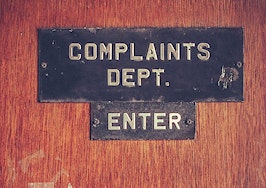When I look at the medical industry, I feel good about being in real estate. It’s competition that makes us try harder and do better. We need to provide excellent customer service if we want to stay in business, and we only get paid after the outcome — and only if it’s a positive outcome.
Let’s take a look at what the real estate industry would be like, if it operated like our health care system does.
If real estate was more like the health care industry …
The consumer experience would be different. Our clients would schedule appointments with us ahead of time, unless it was an emergency. We would charge them extra to walk into our offices because of a real estate emergency.
When our clients arrived at our offices for their appointment, they would be greeted by a surely receptionist after waiting in line. They would be asked questions and would need to prove they could pay for our services. They may even be given a pile of forms to fill out.
Our clients would then be sent to the crowded waiting room. They might sit next to the man with the bad cough who is right behind the crying baby with a fever.
Clients would wait a half hour, or if they are women, they might get to wait two hours. When we had the time, we would send someone out to the waiting room to bring our client back to a little office where they would sit and wait some more with most of their clothes off.
Instead of seeing them ourselves, we would send in an assistant to take their information and find out what kind of house they want to buy or sell. After the assistant is all done he or she would leave the room where our client would wait some more.
We would step into the tiny office, spend five minutes with the client, ask him or her to fill out a bunch of forms, leave him or her with the receptionist and then make a listing appointment or schedule a time to tour houses.
Real estate agents would be able to diagnose the needs of clients, provide services based on the diagnosis and ignore everything the client said.
Inspection results would take a few days. No more having an inspection and getting a report the same day. We would have onsite laboratories for lead-based paint testing and would add a $100 convenience fee for using the service.
Clients would not be able to shop around for testing services.
The all-powerful dollar
Homebuyers could ask how much a house will cost, and they would be given a range. In fact, homebuyers would just get a number at the closing and could only get an itemized bill if they asked for it.
The bill would include some fees for services that the real estate agent never performed, and the property address might be correct, but it might not be.
If the buyer wanted to contest the charges, it would trigger a process that could take up to 90 days. Once it was all straightened out, the buyer could close on the house and take possession.
We would get paid even if the sale did not close. In addition, we would get health insurance and paid vacations as well.
Some real estate agents would practice defensive real estate the same way that doctors practice defensive medicine. Those agents would make sure homebuyers bought a house that was bigger and more expensive than what they wanted “just in case.”
If a homebuyer or seller wanted to work with us out of network (out of the neighborhood we usually work in), they would have to pay 150 percent of the asking price. At no time would the real estate agent let the client know that the house is out of network. It would be up to the consumer to find that out.
If our clients need a for sale sign, we send them to the for sale sign store where they are charged 400 percent the actual cost of the sign. We tell them the high cost is because we are doing sign research. The sign company sells the same signs in Canada for 300 percent less.
Under the medical industry system, we would send our clients to the lender who works for the company that we work for, and they could only use our in-house title services. If they wanted to work with us there wouldn’t be any choices. Out-of-network charges could also be added to loan origination fees and title work.
Complaints about agents could go to the agent or the agent’s broker. If clients want to take legal action they cannot arbitrate, go to small claims court or file an ethics complaint, but they could sue for malpractice.
Competition makes us better
Sure, there are some pain points for consumers who want to buy houses, but compared with the health insurance (often called health care) and pharmaceutical industry, I see even bigger problems, and they keep getting worse as prices continue to rise and quality health care declines.
In the real estate industry, there is fierce competition. Consumers have choices.
We are always trying to do things better and be better. We know we can be better, and if we don’t try, our competition will win our business, or consumers will work around us.
In the health insurance/health care industry, there is little competition, which makes the idea of customer service or good faith estimates absurd — and so is being paid based on the outcome. People die every day even after receiving medical treatment.
Teresa Boardman is a Realtor and broker/owner of Boardman Realty in St. Paul. She is also the founder of StPaulRealEstateBlog.com.








